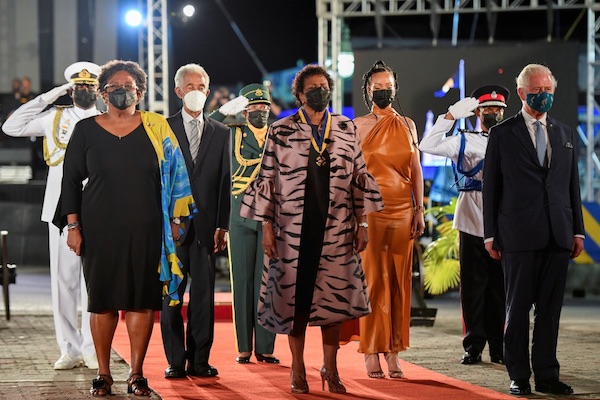
There were international celebrations as the Caribbean island of Barbados ended the reign there of Britain’s monarchy on Monday after 364 years.
During the inspiring handover ceremony, England’s Prince Charles was forced to apologise for Britain’s shameful role in the slavery industry, which deeply affected the small island.
As the clock struck 12, the Royal Standard flag representing England’s queen was lowered over Heroes Square in Bridgetown, and the world’s newest republic was born.
Guests in the square applauded as Dame Sandra Mason was sworn in as president by the chief justice and took the oath of allegiance to her country. Hundreds of people cheered and a 21-gun salute was fired as the national anthem was played.
“Republic Barbados has set sail on her maiden voyage,” Mason said in her inauguration speech as the first president of the country, recognising the “complex, fractured and turbulent world” it would need to navigate.
“Our country must dream big dreams and fight to realise them,” she said.
“Possessing a clear sense of who we are, and what we are capable of achieving, in the year 2021, we now turn our vessels about towards the new republic. We do this so that we may seize the full substance of our sovereignty.”
From the 17th to the 19th century, Barbados became the destination for thousands of Africans kidnapped in their native land and transferred in slave ships, in horrific conditions, to provide the free labour that drove the colonial sugar plantations.
Barbados also became the destination for thousands of Irish, shipped to the island in Cromwellian times, as the English sought to clear the land for plantation and enslaved thousands of dispossessed Irish for their new sugar plantations.
“Full stop this colonial page,” Winston Farrell, a Barbadian poet said in a reading at the ceremony. “Some have grown up stupid under the Union Jack, lost in the castle of their skin.”
Prince Charles delivered a reconciliatory speech to mark the royal retreat.
“The creation of this republic offers a new beginning,” he said. “From the darkest days of our past and the appalling atrocity of slavery, which forever stains our history, people of this island forged their path with extraordinary fortitude.”
One of the first acts of the new republic was to declare Rihanna a National Hero of Barbados. “May you continue to shine like a diamond and bring honour to your nation,” Prime Minister Mia Mottley told the international popstar.
The creation of the republic of Barbados served as an inspiration for Scottish independence, wrote political commentator Laura Waddell.
A recent poll puts support for independence in Scotland at a recent high of 55% in favour. Their First Minister, Nicola Sturgeon, last week set a goal of 2023 for a second independence referendum.
“Charles was there to symbolise the very thing Barbados has decided to reject,” wrote Waddell.
“Next to Charles, Mottley and Mason were there because they had earned their places, elected by citizens. These two women leaders are figureheads of a modern nation choosing a future of self-determination. It is inspiring to see.”
Hopes were also boosted in Ireland for the end of the British occupation here.
Sinn Féin spokesperson on Foreign Affairs and Defence John Brady offered his congratulations to Barbados.
“The event has severed their association with the British Monarchy, 400 years after the English first colonised the island,” he said.
“The occasion of the formation of the new republic offers new opportunities for Barbados as the island nation becomes the master of their own fate.
“I wish every success to this new republic, to its government, its new president, and above all - to the people of Barbados.”
![[Irish Republican News]](https://republican-news.org/graphics/title_gifs/rn.gif)
![[Irish Republican News]](https://republican-news.org/graphics/title_gifs/harp.gif)

